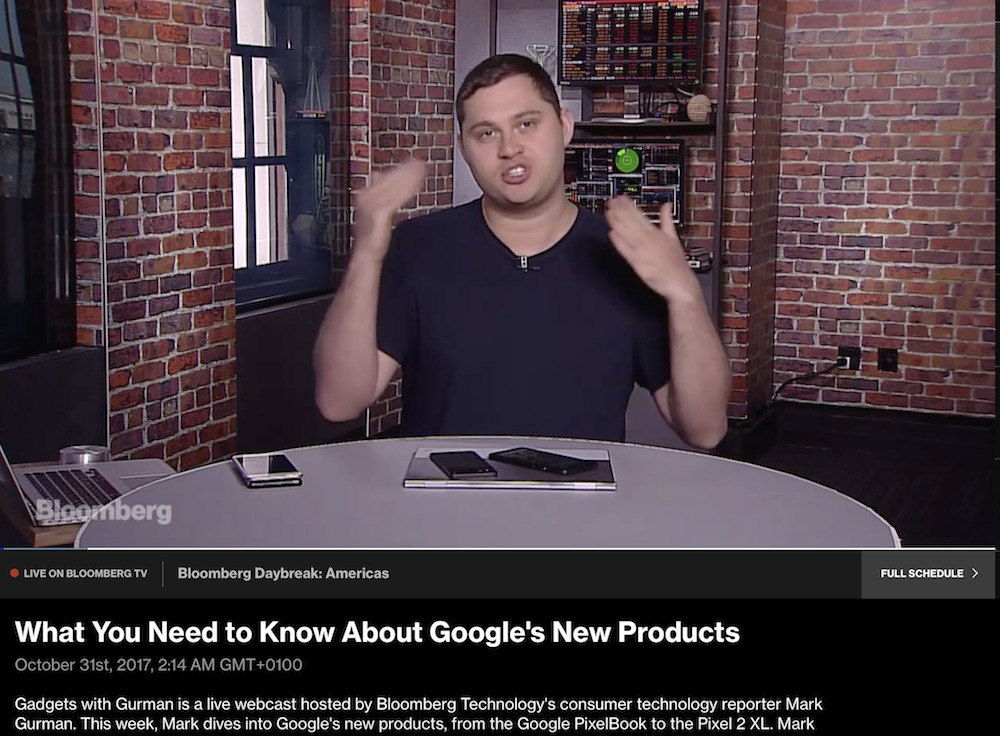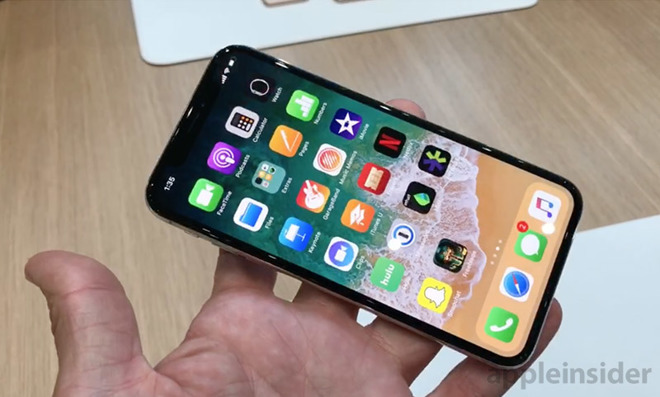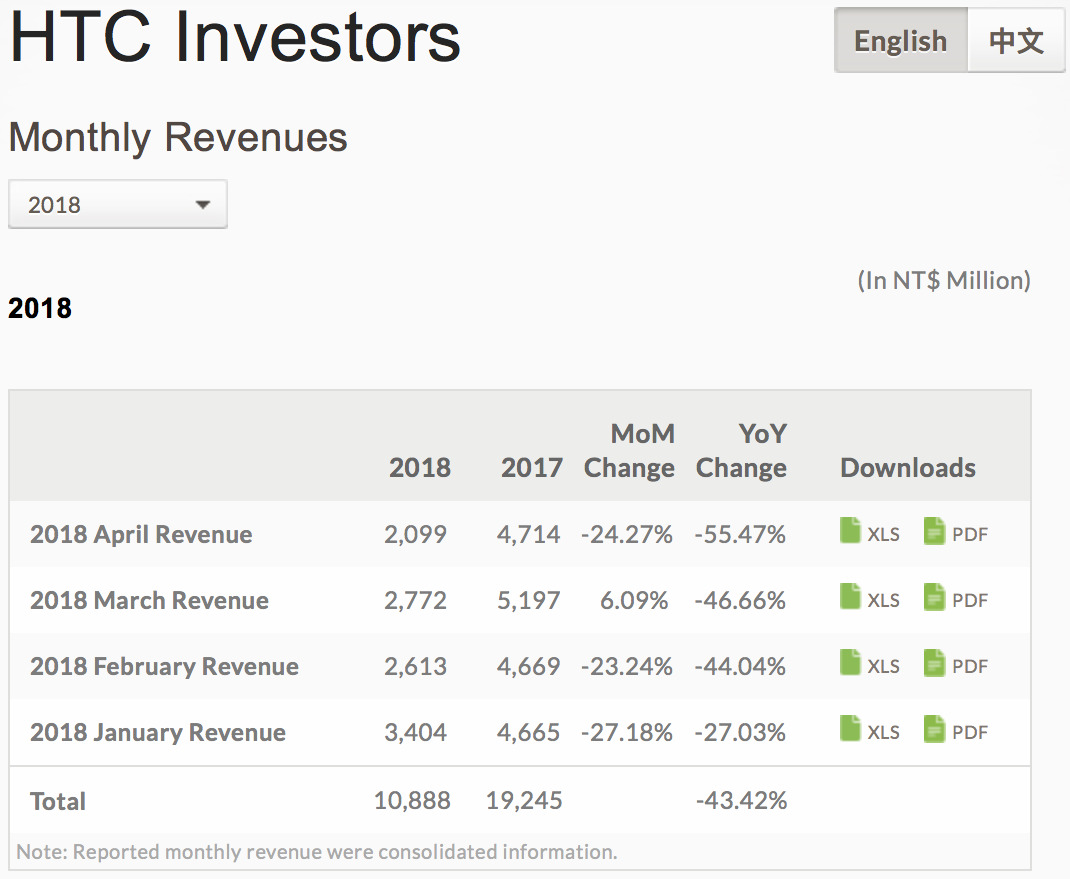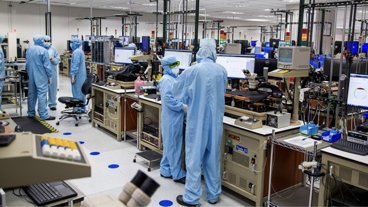Consumer tech reporting by Bloomberg spent the last year aggrandizing Google's Pixel business while portraying Apple's iPhone X as a miserable, disappointing failure— supposedly informed by sources "familiar with" Apple's supply chain. Oddly enough, while Bloomberg's reporting on iPhone X was disastrously wrong, it made no effort to look for troubling concerns among Google's suppliers.
Bloomberg was not alone in working to establish a "failing iPhone X" media narrative. The Wall Street Journal, Japan's Nikkei and many other sources and analysts contributed to the group delusion, all ostensibly grounded in "channel checks" with Apple's component suppliers, despite the fact that rumors of order cuts have historically been a terrible predictor of actual demand for Apple products.
Incorrectly Channel Checking Apple into the ground
However, the incessantly negative portrayal of Apple by Bloomberg was carried alongside an aggrandizing narrative that simultaneously portrayed Google's Pixel business as being successful and noteworthy— an idea just as contrary to fact.
For example, over the 13 episodes of the Bloomberg "Gadgets with Gurman" video series, four were centered on Google hardware — more than its coverage of Apple, but also far more than any coverage of Androids that actually sell in any quantity, particularly Samsung's (which represents about half of Android phones sold and the vast majority of higher-end smartphones in the US).
 Bloomberg provided disproportionate, informercial-like coverage of Google's Pixel products without any supply chain scrutiny
Bloomberg provided disproportionate, informercial-like coverage of Google's Pixel products without any supply chain scrutinyAt the same time, Bloomberg also portrayed Apple's iPad business as playing second fiddle to Google's Chromebook Pixel, with the implication that maybe Macs weren't selling so hot either, and that maybe Android Tablets were not falling off a cliff.
If someone gives you the wrong directions once, you can forgive it as a mistake. But if they chart out a detailed series of turns that are all totally the wrong way, it begins to look like they don't really want you to arrive at your intended destination.
Bloomberg also took issue with Apple TV, complaining that it had failed to become a "groundbreaking, iPhone-caliber product," despite the fact that no other TV or gaming console (or anything else) has ever come close to achieving the sales or impact of iPhone either.
Bloomberg even dumped on Apple's Services business, suggesting that Apple TV's strategy of "turning the television set into a giant iPhone: a cluster of apps with a store," was a loser idea that "Apple has essentially settled for."
Yet Apple's Services segment focused on apps and service subscriptions (including Apple's own iCloud and Apple Music, as well as Netflix, HBO Now and Hulu, all targeting Apple TV) is one of the most closely watched growth areas for the company and is doing phenomenally well.
Apple now services well over a quarter billion paid subscriptions. Its quarterly Services revenues alone ($9 billion) are close to Facebook's ($12 billion), despite the entire company being valued by Wall Street at less than twice the market cap of Facebook. Bloomberg is wielding unverifiable data rumors from anonymous sources as its weapon of choice against Apple, but interestingly enough it doesn't poke anyone else with the same sword
Apple Music subscriptions aim to sell HomePod, another product Bloomberg recently disparaged as "weak", again based on "channel check" reporting that selectively announced a rumored production cut without noting that Apple has multiple suppliers building HomePod.
Bloomberg is wielding unverifiable data rumors from anonymous sources as its weapon of choice against Apple, but interestingly enough it doesn't poke anyone else with the same sword.
In fact, when Samsung reported less growth from its displays unit, Bloomberg turned it into a story of iPhone X supposedly being the reason, despite the fact that Samsung's biggest display client is Samsung. At the same time, iPhone X was reported to be selling well in China despite an overall contraction in demand in that critical market— one where Samsung itself has been suffering.
What about Google's supply chain?
While consistently portraying Apple as struggling, befuddled and incompetent, Bloomberg has lavished attention on Google's Pixel-branded hardware business despite the fact that the company's devices barely sell. Its Pixel tablets have been discontinued and its expensive Chromebook Pixel flagship notebook canceled. Across two years of trying, Google's Pixel phones sold short of 4 million units.
Microsoft's Windows Phone platform, over its last year of collapsing into obscurity and cancellation, sold over 26 million devices: 650 percent of the phones Google shipped under its Pixel brand across two years of incessant promotion by Google and its fan blogs, in which Bloomberg could effectively be included.
Was this failure impossible to predict? Not if anyone bothered to check the performance of Google's Pixel suppliers LG and HTC. Yet despite supposedly having "people familiar with the matter" embedded within Apple's suppliers, Bloomberg didn't seem to have the foggiest notion what the far less secretive Google was up to, nor did it seem to be interested about its business end.
Further, while Bloomberg and others enthusiastically covered Google's $1 billion acquisition of portions of HTC's phone design team, nobody seemed to think it was useful to point out that HTC still builds the Pixel 2, and that HTC's sales are in the toilet.
HTC reports revenues monthly, charting out a sad story of Android tears that began in earnest back in 2010 when Google partnered with the Taiwanese phone maker to produce its original Nexus One.
HTC had been a contract manufacturer for a series of Windows Mobile vendors. Its growth was blunted with the introduction of iPhone, but its early partnership with Google's Android brought it back to 67 percent annual growth in 2011. Then things went badly.
HTC's own phones were destroyed by Android peers when Google's Nexus subsidy passed to Samsung, LG and Motorola. Its next collaboration on Google's Nexus 9 tablet was a bust. Selected by Google to build the Pixel, HTC's sales slipped again, and despite retaining Pixel 2 production, HTC continues to report a bloodletting. Google's Pixel is effectively helping to starve its own supply chain to death
Despite Google's "help," HTC's revenues in 2018 so far have collapsed by more than 43 percent over the year-ago period, and the YoY change is progressively getting worse on a monthly basis.
April revenues were down over 55 percent YoY compared to the year of Pixel 1. And HTC's numbers are down over 92 percent from where they were in 2011 when Android seemed like a good strategy for HTC. Note that this isn't rumored data involving some element of the Pixel supply chain. It is public data reported directly by Pixel 2's supplier!
Yet despite breathlessly reporting rumors of Apple's supply chain activity and freely interpreting the data as weak and disappointing, Bloomberg hasn't given Google similar treatment. It doesn't even appear to care about whether Pixel actually sells or not, or if any are even still being built. Yet in reality, Google's Pixel is effectively helping to starve its own supply chain to death.
What about Apple's legitimately reported supply chain data?
At the same time, while Bloomberg helped promote the fiction of iPhone X being a disastrously disappointing product that nobody wanted, purely by reading the tea leaves it got from some anonymous source supposedly "familiar" with Apple's business, the site has totally ignored the actual supply chain facts Apple reports in its audited securities filings.
In his most recent Monday Note, Jean-Louis Gasse drew attention to Tim Cook's chops in "running a superb Supply Chain Management (SCM) operation," stating, "Legend has it that the LG phone operation that manufactures handsets once went to their sister division to get displays only to face a closed door. Why? The entire display production had been bought and paid for by a single client: Apple."
Gasse referenced Apple's Manufacturing Purchase Obligation, the figure it reports in its 10-Q filings as having paid to secure future production capacity, and cited MPO analysis by Asymco's Horace Dediu that closely correlated those investments Apple makes in its supply chain with the company's future revenue.
"When the MPO dropped from $19B in Q2 2015 to $15.5 in Q2 2016, sales also took a dive: $234B to $216B. It was a big event at the time— and it was neatly predicted by the MPO drop. The next year, MPO rebounded to $21.7B and, right on schedule, sales rose to $229B," Gasse wrote, adding, "this year the number rises to $27.1B. The healthy MPO increase— up 24.9%— portends an optimistic Apple."
Supposedly independent "supply chain research" at Bloomberg, the Wall Street Journal and Nikkei all managed to somehow stumble on rumored reports of order cuts that their reporters felt competently versed in interpreting, despite their own terrible track records at doing so.
Yet none of these sites, nor their sources supposedly "familiar with Apple's matters," has paid attention to the data Apple itself reports on its supply chain investments, a far more reliable indicator. The best explanation appears to be that this data didn't fit the narrative of doom those writers have been seeking to establish.
Others have noted material facts supporting Apple that aren't just freely interpreted rumors sourced anonymously, including the above mentioned Horace Dediu of Asymco and Jean-Louis Gasse, as well as Charles Arthur of the The Guardian , Ben Bajarin of Creative Strategies, Neil Cybart of Above Avalon, Jan Dawson at Jackdaw Research, Philip Elmer-DeWitt of Apple 3.0, John Gruber of Daring Fireball, John Kirk of Techpinions, Ben Thompson of Stratechery and frequently-tweeting analysts AAPL Tree, Daniel Tello and Kontra.
The data seems to be available if you're looking for it.
 Daniel Eran Dilger
Daniel Eran Dilger








-m.jpg)






 Andrew Orr
Andrew Orr
 Amber Neely
Amber Neely
 Marko Zivkovic
Marko Zivkovic
 William Gallagher and Mike Wuerthele
William Gallagher and Mike Wuerthele



 Mike Wuerthele
Mike Wuerthele








69 Comments
maybe they just don't expect much from Google, but do expect a lot from Apple. No use reporting on shortcomings when you know they are there, and are expected.
Why would anyone care about "Google's Pixel supply chain"? What exactly would you realistically expect reported and why?
With that said the lack of sales didn't prevent the blogosphere blasting at full-volume every perceived failure of the Pixel line whether real, imaginary, widespread or one-off. The tech writers are equal-opportunity click-baiters. If there's a "name" and a possible nega-story they will write it. Apple fans already know that.
As for HTC they were pummeled by an overwhelming Samsung ad campaign in the West going back to 2010, and hammered by an aggressively-priced Xiaomi in China ever since too, with Huawei putting last nails in their coffin. Their unimaginative 2012-2016 phones helped hasten the slide.
Google's hardware orders from them were never going to be any more a blip which surprises absolutely no one, so HTC's poor showing since their heyday certainly can't be blamed on Pixels. May as well blame it on Windows Phone which is what they started out with years before Android. It's the HTC Sense phones for T-Mo/Verizon/Orange and those built for the massive Chinese market that were left wanting and thus competed poorly. Where HTC once was in the forefront on smartphone design many of their recent handsets now look dated and uninspired. They simply weren't prepared for the dual assault of Samsung and the high-spec/low-price Chinese manufacturers.
In hindsight they might have been better off as a contract manufacturer which is where they started. The expectations for their demise have been in the news since 2011, this ain't nuttin' recent.
What struck me about the iPhone X rumors was the number of them and the fact that they came from several outlets; it almost seemed like one source reported it and everyone else had to do it because of journalistic peer pressure.
Not to excuse Bloomberg, but I suspect the much smaller sales of the pixel would make supply chain analysis more difficult to do. If it failed with a big seller like the iPhone, how could you hope to use it with the pixel?
Thats why i dont read Bloombug....fake news outlet, and for sure they wont correct thier mistakes....
I think Google influences the media quite a bit. This was covered in the news awhile back.
I also agree that Apple stock is manipulated. I can’t prove it, but the pattern has been happening for awhile now.